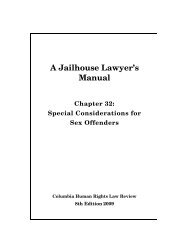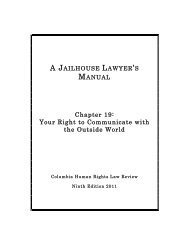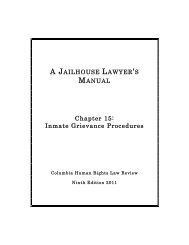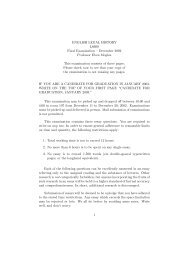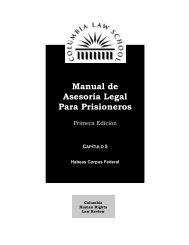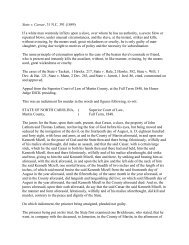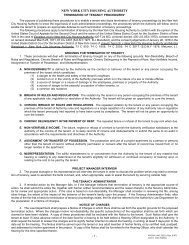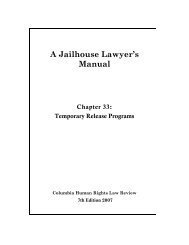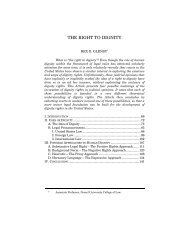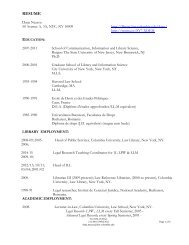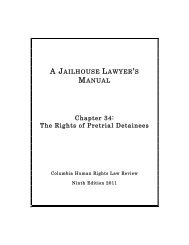A Right to Media? Lorie M. Graham - Columbia Law School
A Right to Media? Lorie M. Graham - Columbia Law School
A Right to Media? Lorie M. Graham - Columbia Law School
You also want an ePaper? Increase the reach of your titles
YUMPU automatically turns print PDFs into web optimized ePapers that Google loves.
2010] A RIGHT TO MEDIA? 445<br />
guarantees of respect for the rights <strong>to</strong> freedom of expression and<br />
information lies in the existence of independent media, electronic and<br />
print, in which ownership is diversified.” 52 The Special Rapporteur<br />
has listed several fundamental steps that may enhance the right <strong>to</strong><br />
seek, receive, and impart information through media. These include<br />
avoiding a monopoly or concentration of ownership of media in the<br />
hands of a few; developing a plurality of viewpoints and voices in the<br />
media; having state-owned media report on all aspects of national life<br />
while respecting a diversity of viewpoints; and creating clear and<br />
balanced laws <strong>to</strong> govern the allocation of broadcasting frequencies. 53<br />
The ICCPR 54 along with the International Covenant on<br />
Economic, Social, and Cultural <strong>Right</strong>s (ICESCR) are two major<br />
treaties that implement these principles. 55 Both contain language <strong>to</strong><br />
protect the rights of expression and information, which are in turn<br />
linked <strong>to</strong> questions of equality and access <strong>to</strong> media. 56<br />
For instance, Article 19(2) of the ICCPR states that “everyone<br />
shall have the right <strong>to</strong> freedom of expression; this right shall include<br />
the freedom <strong>to</strong> seek, receive, and impart information and ideas of all<br />
kinds, regardless of frontiers, either orally, in writing or print, in the<br />
form of art, or through any other media of his choice.” 57 This<br />
reiterates Article 19 of the UDHR, and creates binding obligations on<br />
state parties <strong>to</strong> allow the free flow of information. The ICCPR also<br />
states in Article 26 that “all persons are equal before the law and are<br />
entitled without any discrimination <strong>to</strong> the equal protection of the<br />
law.” 58 This includes all persons having the same level of freedom of<br />
52. Human <strong>Right</strong>s During Imprisonment, supra note 25, para. 17.<br />
53. ECOSOC, Comm’n on Human <strong>Right</strong>s, Civil and Political <strong>Right</strong>s<br />
Including the Question of Freedom of Expression, paras. 101–16, U.N. Doc.<br />
E/CN.4/2001/64/Add.1 (Jan. 23, 2001) (prepared by Mr. Abid Hussain).<br />
54. ICCPR, supra note 36, art. 25.<br />
55. ICESCR, opened for signature Dec. 16, 1966, art. 1, 993 U.N.T.S. 3, 5<br />
(entered in<strong>to</strong> force Jan. 3, 1976).<br />
56. The ICCPR and the ICESCR are meant <strong>to</strong> be interpreted <strong>to</strong>gether,<br />
since civil and political rights (such as freedom of expression) have little value if<br />
people are lacking in basic economic and social rights. See G.A. Res 2200 (XXI),<br />
para. A, U.N. Doc. A/RES/21/2200 (Dec. 16, 1966); see also David Marcus, The<br />
Normative Development of Socioeconomic <strong>Right</strong>s Through Supranational<br />
Adjudication, 42 Stan. J. Int’l L. 53 (2006) (arguing against the subordination of<br />
socioeconomic rights <strong>to</strong> civil and political rights as these rights are connected and<br />
interdependent).<br />
57. ICCPR, supra note 36, art. 19.<br />
58. ICCPR, supra note 36, art. 26



